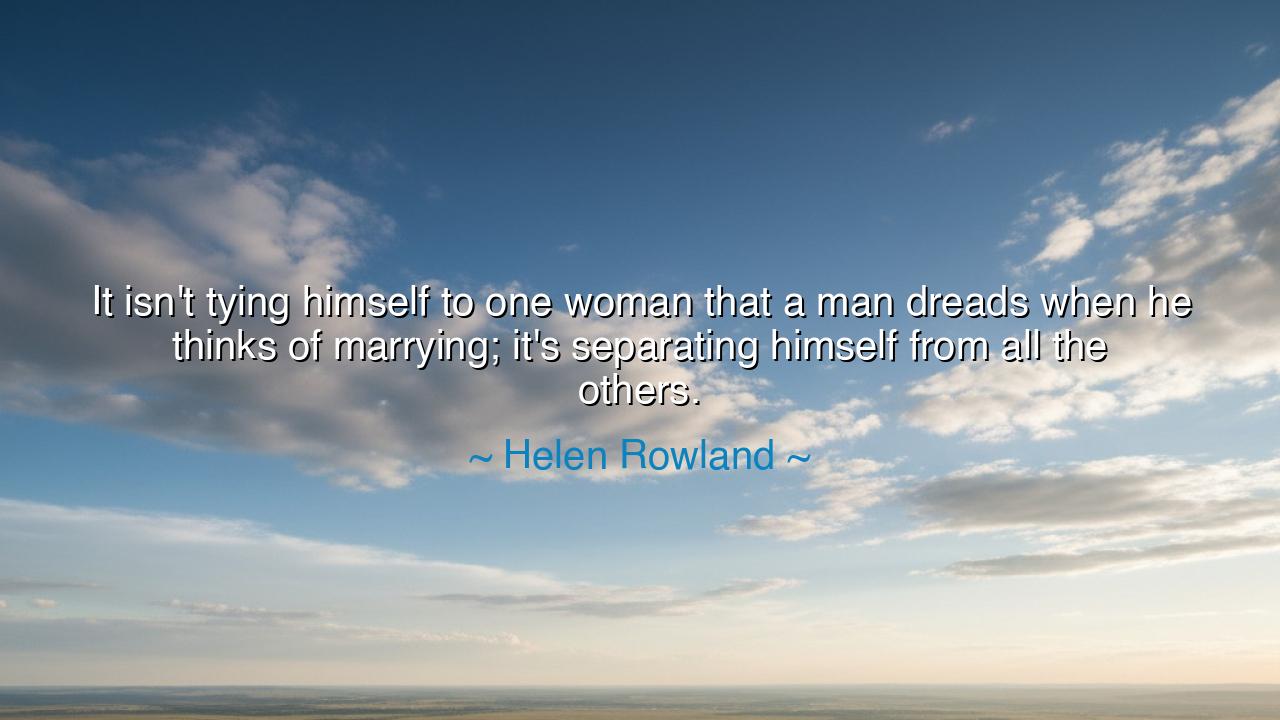
It isn't tying himself to one woman that a man dreads when he
It isn't tying himself to one woman that a man dreads when he thinks of marrying; it's separating himself from all the others.






“It isn’t tying himself to one woman that a man dreads when he thinks of marrying; it’s separating himself from all the others.” These words by Helen Rowland, the sharp-tongued essayist of love and courtship, pierce the veil of romance to expose the deeper truth of human longing. Beneath their wit lies a profound understanding of the heart’s dual nature — its desire for devotion, and its fear of renunciation. For love, when true, does not merely ask for union; it asks for sacrifice. It demands that one choose not only whom to love, but whom not to love — and in that narrowing, a person’s freedom is both lost and found.
The ancient sages would have understood this tension well. They taught that freedom without discipline is illusion, and that only through commitment does the soul discover its real strength. In Rowland’s insight, the dread of marriage is not fear of the beloved, but of the death of infinite possibilities — the quiet mourning of all the faces one will never again chase, the roads one will never walk. To love one deeply is to say farewell to a thousand fleeting desires. It is not the chain that binds the man, but the closing of the gate behind him that he hears echo in his heart.
Yet this is the paradox of love: what feels like loss becomes the gateway to something greater. Consider the story of King Odysseus, whose heart was tested across twenty years of separation from his wife, Penelope. Tempted by nymphs, delayed by goddesses, he wandered through seas of passion and promise. But in the end, he longed not for the many, but for the one. His journey — vast and filled with allure — became meaningless without her waiting presence. When he returned, it was not freedom he reclaimed, but belonging. The same man who once roamed the world found his peace not in new conquests, but in the arms of constancy. Thus, love does not diminish freedom; it refines it.
The fear of separation from all others arises from the restless part of human nature — that eternal wanderer within us who wishes to taste every fruit, to know every mystery. But life, in its quiet wisdom, teaches that abundance is not found in endless choice, but in deep cultivation. The man who dreads losing all others has not yet understood that when one truly loves, all others fade into shadows — not by force, but by grace. For the heart cannot hold two eternities; it must choose its temple and dwell there fully.
Rowland’s quote also reflects the age-old struggle between desire and duty, freedom and fidelity. Many seek love as pleasure, but fear it as permanence. They wish to drink deeply of affection, yet recoil at the thought of surrendering their sovereignty. But the ancients knew that the truest power lies not in having all things, but in choosing one thing and giving oneself wholly to it. To marry, then, is not to lose liberty — it is to dedicate it. To love faithfully is not to be chained, but to have one’s restless spirit anchored in meaning.
Let us look to another example: Socrates, who often spoke of marriage with humor and caution, yet whose relationship with his wife Xanthippe became a living lesson in endurance and wisdom. While history paints her as temperamental, Socrates called her his greatest teacher — for through her, he learned patience, humility, and the art of peace within turmoil. It was not the many who refined him, but the one. And in that refinement, he found a kind of truth no wanderer ever discovers: that through the limits of love, one meets the infinite depths of the soul.
Thus, the lesson of Rowland’s words is timeless: commitment is the crucible of maturity. The heart that cannot part from its desires remains a child; the one that chooses and stays becomes whole. To love one person faithfully is to master the art of focus in a world of distraction, to trade the thrill of the temporary for the quiet glory of the eternal. Those who fear to lose “all others” have not yet understood what it means to gain everything in one.
So, my child, when you ponder love, do not see it as the loss of freedom but as its awakening. For the man who fears to let go has not yet learned to hold. The woman who demands constancy teaches him the sacred discipline of devotion. In separating from all others, the soul learns unity; in binding itself to one, it becomes free. And in that paradox — the oldest and truest of human truths — lies the wisdom of love that endures beyond time itself.






AAdministratorAdministrator
Welcome, honored guests. Please leave a comment, we will respond soon